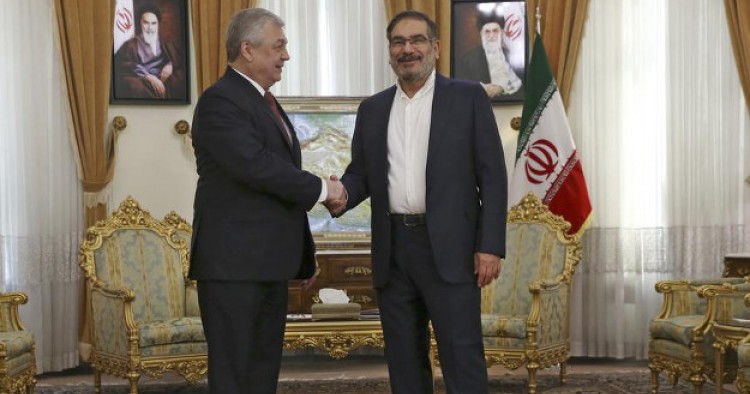Russian President Vladimir Putin’s special envoy on Syria today met with Iranian officials in Tehran to assess the latest developments and coordinate the two countries’ military and diplomatic efforts regarding the Syrian war. According to Iranian media, Alexander Lavrentiev briefed Iranian officials on Moscow’s recent talks with other foreign powers regarding Syria ahead of the next Astana meeting. In a meeting with Secretary of Iran’s Supreme National Security Council Ali Shamkhani, Lavrentiev however assured Tehran that Moscow remains committed to continuing its military mission in Syria parallel to the diplomatic efforts at Astana and elsewhere to find a political end to the six-year conflict. He reportedly told Shamkhani that the Russian military will continue military action against the Islamic State, Jabhat al-Nusra and opposition groups that would not seek a peace deal with the Bashar al-Assad regime.
Shamkhani hailed the latest territorial gains by the Assad regime and its foreign allies, and stressed that all foreign nations must respect Syria’s territorial integrity. He also defended the recent deal between Hezbollah and the Islamic State to transfer hundreds of Islamic State militants from the Lebanese-Syrian border area to eastern Syria, close to Iraq. “Hezbollah’s move to allow a number of militants under siege from one operational field in Syria to another front in that country is an operational tactic and does not impact the strategy to fight the terrorists,” he said. Shamkhani also noted that the Syrian government and its allies had previously transferred terrorists from Homs to Idlib as part of a similar plan as well.
Lavrentiev also discussed the upcoming Astana summit with Deputy Iranian Foreign Minister Hossein Jaberi Ansari. "Such negotiations before Astana talks are important to us," Lavrentiev reportedly told the Iranian diplomat. "The two countries trust each other very much and this helps us."
Comment: Russia, Iran and Turkey are scheduled to hold the next round of talks on the Syrian war in Astana, Kazakhstan on September 14 and 15. The three nations and the Syrian regime are expected to discuss the so-called de-escalation zones in Syria, particularly in Idlib. The three nations failed to agree on creating the four de-escalation zones because of Turkish objections. But there have been high-level direct talks between Tehran and Ankara since the last round of talks and the two sides appear to have ironed out some of their differences regarding Syria, including the situation in Idlib.
Some in Tehran have raised doubt that Russia might strike a grand bargain with the United States at the expense of Iran’s interests. Lavrentiev’s remarks in Tehran appear to be aimed at assuaging those concerns.
The Middle East Institute (MEI) is an independent, non-partisan, non-for-profit, educational organization. It does not engage in advocacy and its scholars’ opinions are their own. MEI welcomes financial donations, but retains sole editorial control over its work and its publications reflect only the authors’ views. For a listing of MEI donors, please click here.












